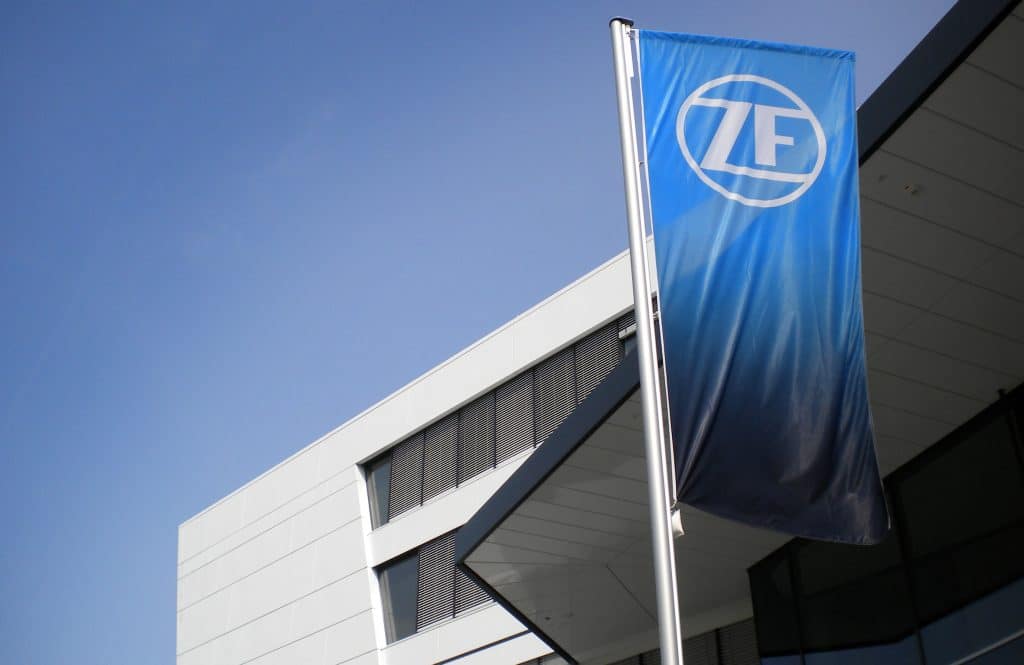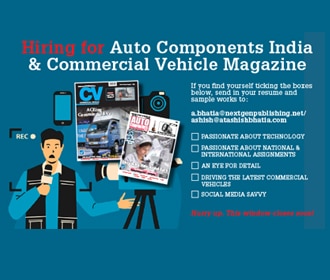Press Release
- Early and effective cost reduction measures secure liquidity of the company
- Group structures and capacities will be aligned in the long term to a global decline in vehicle production and technology shifts
- Foundation of a new division for electric car drives
- WABCO integration on schedule
- “Transformation Collective Agreement” flexes working hours of around 50,000 employees in Germany
- Positive adjusted EBIT expected for the current year
With global vehicle markets slowly recovering, ZF is ramping up its production capacities and expects a positive adjusted EBIT for the full year. In the first half of 2020, the company generated sales of €13.5 (2019: €18.4) billion under difficult conditions. Sales compared to the same period last year were down 27 per cent. Thanks to quickly initiated and effective measures to adjust expenses and costs, adjusted EBIT was maintained at minus €177 million. In the second half of the year, ZF will focus on adapting the company to the new economic and technological conditions and strengthening its financial independence.
“Together with all ZF employees worldwide, we effectively adjusted our costs in March and reduced them by more than one billion euros in the first half of the year,” said ZF CEO Wolf-Henning Scheider, addressing the figures for the first half of the year. “In the second half of the year, we will now ramp up production everywhere, return to positive operational performance and realign structures and capacities for the long term. We will strictly keep to our course, continue to limit expenses, adjust personnel capacities to sales levels and invest very selectively. If there is no major Covid-19 wave in the next few months and the market level in the second half of the year is in the range of minus 10 to minus 15 per cent below the previous year’s level as we anticipated, then ZF can – even in this extraordinary period – achieve a positive adjusted EBIT at the end of the year.” ZF’s expected annual profit will nevertheless be negative.
Scheider recalled that due to the weaker market development over the past two years, ZF had already begun to adjust structures and capacities before the outbreak of the pandemic: “With our Next Generation Mobility strategy, we have defined the Group’s long-term orientation and formulated our goals. We are on the right track. Within the core areas of technology transformation, our business orders have developed well despite the unprecedented conditions of the first half of the year. We were able to win a number of key awards in the areas of e-mobility, advanced driver assistance systems and the relevant advanced sensors and intelligent actuators.”
According to Scheider, positive trends were also evident when it came to business wins for bus transmissions and electric bus drives as well as in the aftermarket. ZF’s Wind Power division is also benefiting from strong market growth outside of Europe. In view of the increasing worldwide interest in a hydrogen economy, there are further interesting developments for this business unit.
New division drives transformation forward
ZF recently announced a further important step in the company’s ongoing transformation towards e-mobility. On January 1, 2021, a new division will be formed from the current Car Powertrain Technology and E-Mobility divisions to offer customers electrified driveline solutions from a single source. In the future, ZF will not invest in transmissions exclusively designed for internal combustion engine vehicles but will focus its development activities on flexible platform technologies for long-range plug-in hybrids and purely electric vehicles.
Scheider continued: “The corona pandemic is noticeably accelerating the transformation of the automotive industry – we expect electrification to come even faster now. We accept this challenge and are decisively driving the necessary changes at ZF in order to better participate in the growing market for electrified car drives. The newly formed division will be able to leverage the system advantages of both divisions and offer vehicle manufacturers a comprehensive electrified drive portfolio as well as worldwide development and production capacities under one roof.”
Scheider expects further momentum following the acquisition of commercial vehicle brake manufacturer WABCO which was completed on May 29. WABCO was integrated into the company as the new Commercial Vehicle Control Systems division and contributes to positioning ZF as a system supplier in the commercial vehicle sector as well and to expand its portfolio for customers in this segment. The integration process, which was started immediately after the closing, is running according to plan – and progressing particularly well in the areas of highly advanced driver assist systems and autonomous functions for commercial vehicles. The new division, whose results for one month are included in the half-year figures, is making a positive contribution to the Group’s results despite the current weak market caused by the coronavirus.
In addition to structural changes, ZF is selectively reducing capacities worldwide to adjust to weaker demand and to anticipate the trend toward greater electrification. In Germany, the company has concluded a “Transformation Collective Agreement” with works councils and unions for this purpose. It stipulates that ZF will not make any compulsory redundancies or close any sites in Germany until the end of 2022. In return, the company can reduce employees’ working hours covered by collective bargaining agreements by up to 20 percent and offer targeted severance packages and part-time work for older employees in Germany. Since mid-2019, ZF has reduced its global workforce by 5,300, including 3,800 since the beginning of this year.
Over 60,000 employees enabled to work remotely
When restarting its operations, ZF developed and established extensive protective measures to help ensure the safety of its employees. “We have made extraordinary efforts to maintain the supply chain,” emphasized Scheider. Within a short period, ZF’s IT teams enabled more than 60,000 employees worldwide at short notice to work remotely by providing the appropriate infrastructure and programs for digital collaboration. At the same time, the software for ZF’s entire digital communication and collaboration was moved to the cloud to adapt performance and availability to the new way of working. Besides, the company made online training courses available, which were well received.
Many ZF employees would like to continue their positive remote work experiences and the virtual work environment in the long term. Since both job satisfaction and productivity have increased through greater flexibility, the company plans to introduce a remote work scheme adapted to regional requirements.
Scheider thanked all employees worldwide for their extraordinary commitment during a difficult situation.
Company heads for positive adjusted EBIT for a full year
Due to the collapse in demand caused by the pandemic and the temporary production standstill in the automotive industry, ZF’s key figures for the first half of 2020 were significantly below the figures for the same period last year. Sales amounted to €13.5 (2019: €18.4) billion. Adjusted for the exchange rate and M&A effects, this corresponds to an organic sales change of minus 27 per cent. The company reported an adjusted EBIT of minus €177 million. This corresponds to an adjusted EBIT margin of minus 1.3 per cent. In the first half of 2019, ZF reported an adjusted EBIT of around €650 million; this corresponds to an adjusted EBIT margin of 3.5 per cent. The net result for the first half of 2020 was minus €911 million.
To expand its financial headroom, ZF secured a new €1.35 billion syndicated credit facility in May with core banks. It supplemented an existing over €3 billion revolving credit facility, which continues to be available in full as a liquidity reserve. In total, ZF has available credit facilities of €4.7 billion at the end of the first half of the year.
“When the coronavirus started, we very quickly set up a network of task forces and initiated countermeasures,” said ZF’s CFO Dr. Konstantin Sauer. “This enabled us to limit the financial impact of the pandemic and stabilize our liquidity through active cash and cost management. This was viewed positively in financial circles. In addition, we are using this crisis management experience to make sustained improvements to our cost structure.” In line with the general market trend, ZF expects sales for the full year to be significantly below the previous year’s level. However, despite the negative result in the first half of the year, the company is still heading for positive adjusted earnings before interest and taxes for the full year and expects a positive adjusted free cash flow. However, these targets are very ambitious, and in view of the volatile economic situation, involve considerable risks, explained CFO Sauer.
Second half-year outlook
ZF expects the market environment to remain very heterogeneous in the second half of the year. “Although Europe is showing signs of recovery at the moment, it will likely be the most critical region in the next few years due to declining vehicle exports and stricter emissions regulations,” said ZF CEO Scheider. Due to the high number of Covid-19 infections currently, development in the Americas is also very uncertain. “China and Asia are currently the most promising markets. Business in this region is coming back very strongly and is helping us to increase our sales again.”
Overall, the global economic situation remains tense. ZF does not expect the market to recover to 2019 levels in the next three years. “This applies to passenger cars and light commercial vehicles up to a weight of six tons, although our forecasts for passenger cars with 88.5 million units in 2023 are still far from the approximately 94 million units of 2018,” explained Scheider. With heavy commercial vehicles, the upswing looks to be slower: in 2023, expected sales of 3.2 million heavy trucks will be 360,000 vehicles below the 2019 figure (3.56 million).
In view of the slow recovery, ZF is taking actions to adapt the company to the new circumstances to achieve a sustained improvement in earnings. Scheider emphasized: “This is crucial to continue investing in future technologies such as e-mobility and autonomous driving, to win business and to further strengthen our financial independence for the future.”












